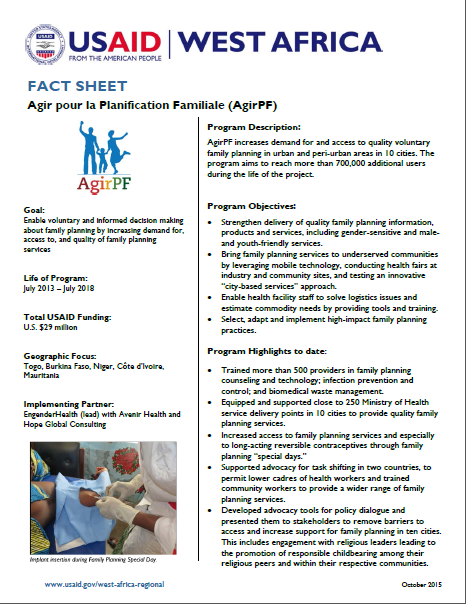Agir pour la Planification Familiale (AgirPF) ![]() (pdf - 123k)
(pdf - 123k)
Goal:
Enable voluntary and informed decision making about family planning by increasing demand for, access to, and quality of family planning services
Life of Program:
July 2013 – July 2018
Total USAID Funding:
U.S. $29 million
Geographic Focus:
Togo, Burkina Faso, Niger, Côte d’Ivoire, Mauritania
Implementing Partner:
EngenderHealth (lead) with Avenir Health and Hope Global Consulting
Program Description:
AgirPF increases demand for and access to quality voluntary family planning in urban and peri-urban areas in 10 cities. The program aims to reach more than 700,000 additional users during the life of the project.
Program Objectives:
• Strengthen delivery of quality family planning information, products and services, including gender-sensitive and male- and youth-friendly services.
• Bring family planning services to underserved communities by leveraging mobile technology, conducting health fairs at industry and community sites, and testing an innovative “city-based services” approach.
• Enable health facility staff to solve logistics issues and estimate commodity needs by providing tools and training.
• Select, adapt and implement high-impact family planning practices.
Program Highlights to date:
• Trained more than 500 providers in family planning counseling and technology; infection prevention and control; and biomedical waste management.
• Equipped and supported close to 250 Ministry of Health service delivery points in 10 cities to provide quality family planning services.
• Increased access to family planning services and especially to long-acting reversible contraceptives through family planning “special days.”
• Supported advocacy for task shifting in two countries, to permit lower cadres of health workers and trained community workers to provide a wider range of family planning services.
• Developed advocacy tools for policy dialogue and presented them to stakeholders to remove barriers to access and increase support for family planning in ten cities. This includes engagement with religious leaders leading to the promotion of responsible childbearing among their religious peers and within their respective communities.








Comment
Make a general inquiry or suggest an improvement.